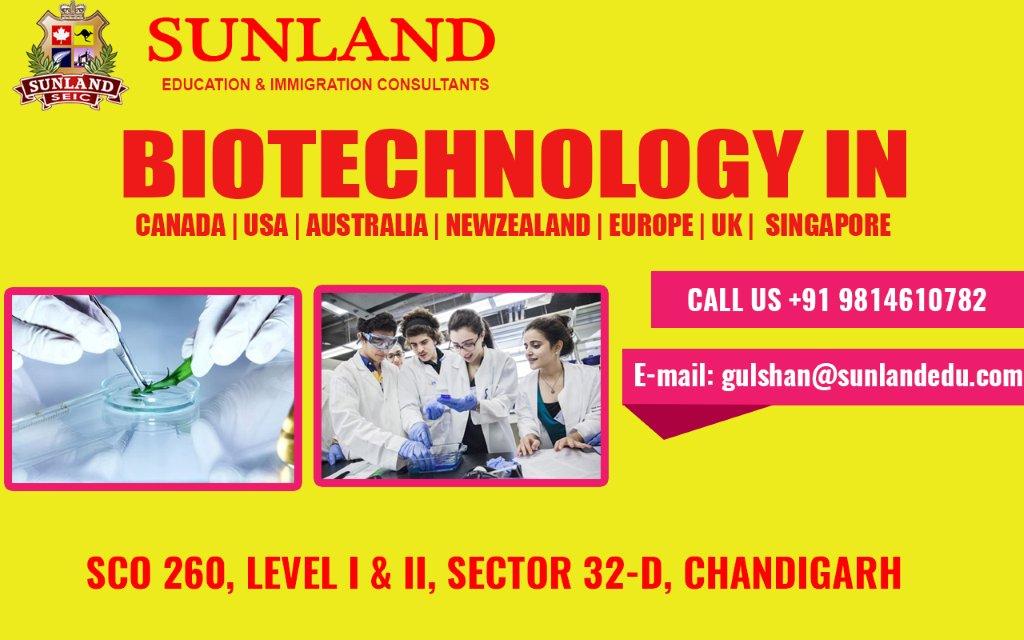Biotechnology is based on biology, especially when used in Agriculture, Food, Science and Medicine. Biotechnology also means any technological application that uses biological systems, Living Organisms. It is basically the manipulation of organisms to do practical things.
Sunland Education & Immigration Consultants, Chandigarh recommend following courses after completing Biotechnology in India are as under:-
- Master of Science in Physiotherapy
- Master of Science in Bio Medical Science
- Master of Science in Bioinformatics
- Master of Science in Microbiology
- Master of Science in Geo Informatics
- Master of Science in Organic Chemistry
- Master of Science Pharmaceutical
- Master of Science in Chemistry
- Master of Science in Agriculture
- Master of Science in Marine
- Master of Science in Veterinary
- Master of Science in Medical
Biotechnology is fast emerging as one of the most popular subjects among Indian students looking to study abroad.
Biotechnologists can find employment in a wide range of industries like food processing, breweries and pharmaceuticals.
Biotechnology, also known as “biotech” is the study of the use of living organisms and systems for the development of products that promise to improve human life. Biotechnology impacts industries as diverse as food processing, pharmaceuticals, agricultural production, cosmetics and rearing animals.
A lucrative career option
In Scotland alone, there are now over 400 dedicated bioscience companies and this sector is growing rapidly, at around 30% per annum. Dundee is a major bioscience centre within the U.K. Studying biotechnology in the UK provides you with an opportunity to learn from experienced academic researchers.
Biotechnology as a bachelor’s degree programme generally takes four years of full-time study. It teaches students basic scientific methods of research, takes them through scientific techniques such as manipulating genes, the functioning of the cell and ways to exploit it. The bachelor’s in biotechnology acts as a stepping stone to further studies in medical, veterinary, or dental studies. Students looking to enroll for a master’s in biotech must at least possess two years of full-time study and for a doctorate; they must have three more years of study.
The UK is leader when it comes to offering biotechnology programs; its universities are well reputed for excellence in research in this field. It offers a wide range of subjects in the fields of genetics, oncology, immunology, forensic science, cell biology, molecular biology, biosciences, molecular biology, bioinformatics, regenerative medicine, and many more.
The United States is renowned as the science world’s largest research base that has government support for its ongoing biotech development and research processes. The country maintains a competitive front for the industry and its development and commercialization. In the 1970s, it is a fast growing industry in the US with spending around $22 billion for R&D in the field.
Singapore, being the education hub of Asia, also offers numerous options in this field. Browse our site to have a look at MDIS’s biotechnology course listed with us from Singapore.
You can also have a look at the numerous kinds of biotechnology courses offered by Monash University from Malaysia, such as programs specializing in Recombinant DNA Technology, Genetics of Development, and many more.
Australia has strengths in biotech related research in the medical, agricultural and environmental fields. Australia’s Government strongly supports the growth and development of biotechnology industry.
About the course
A course in Biotechnology generally aims to produce scientists who will be able to contribute to a range of career opportunities including academic, commercial, industrial and healthcare applications of biotechnology.
The course is made up mostly of laboratory work, computer applications and research. On a typical morning you might be analyzing DNA on a gel and in the afternoon using a fomenter to produce commercial products. One day you might be learning about how microbes can clean up pollution and on another day you get to visit a company that researches new anti-cancer drugs. Students gain a wide range of laboratory-based skills and techniques, which both provide the practical basis for their studies and provide a useful portfolio of employable skills. These skills, plus associated research experience gained in the final year project, will enable you to establish yourself in medical, industrial and research laboratories.
Most programmes offered by universities are based around a set of core modules and a research project that provide experience in key areas of biotechnology:
Research Methods: Communication Skills
Introductory Molecular Biology
Stem Cell Biology
Tissue Engineering
Fermentation / Bioreactors
Cell Culture
Protein Engineering & Production
Enzyme Technology
Bioinformatics
Research Project
Biotechnology and Management
Environmental Biotechnology
Bioscience
Food Biotechnology
Biomedical
Pharmaceutical science
Career Opportunities
The B.Sc. / M.Sc. in Biotechnology provide a firm basis for pursuing a career in any aspect of science involving biotechnology. This could involve the food, pharmaceutical or environmental sectors, molecular biology, genetics, biochemistry, Nano biotechnology, use of microbes, DNA vaccines, production of new materials using new ideas, new drug-delivery systems, organ transplantation, rational drug design, nutraceuticals, plant-based drugs, enzyme engineering and technology, stem cell techniques, and tissue culture. Biotechnologists can find employment in a wide range of industries like food processing, breweries and pharmaceuticals. As the global population grows, scientists look to biotechnologists for solutions to various problems like adequate food, infant mortality and sustainable agriculture. Biotechnologists tap into the resources available now to improve the quality of life.
For getting admission in world class universities, you need IELTS not less than 7 Bands with medical background like +2 Medical, B.Sc. Bio Tech etc. You must be having 65% marks in your academic throughout your academic results. Please try that there should not be any gap in your education. If having gap, you must provide reason of gap.
After meeting all requirements, you need to apply for Offer letter and after that you can apply for Study visa.
For detailed information, please visit us ASAP at following address:-
GULSHAN
M/S Sunland Education & Immigration Consultants
SCO 260, Level I & II, Sector 32-D
Chandigarh (INDIA) – 160 030
+91 98146 10782 / +91 95014 43322
776 total views, 1 views today

